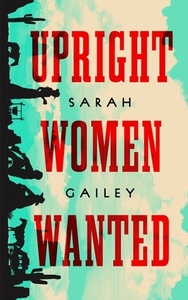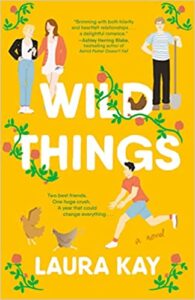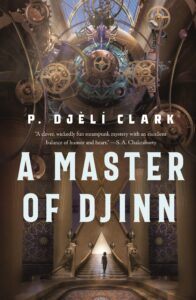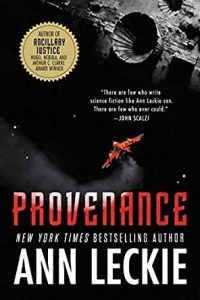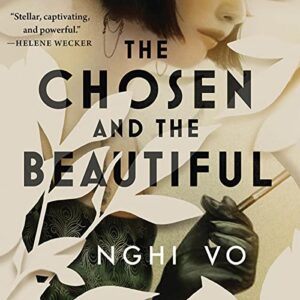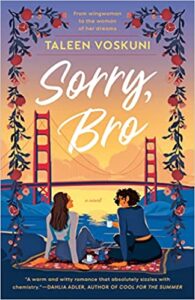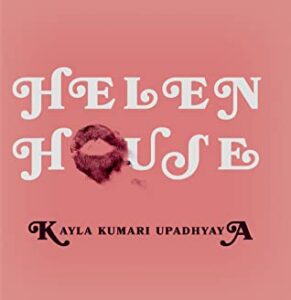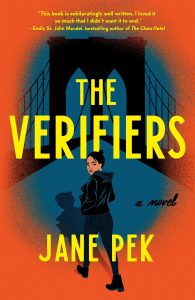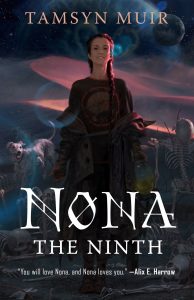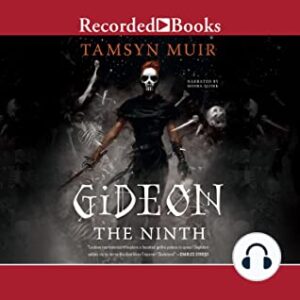Amazon Affiliate Link | Bookshop.org Affiliate Link
I’m not sure when I bought the ebook for Upright Women Wanted. It was probably on sale, and when I heard that there were lesbians and rebel librarians in a western-themed dystopian setting, I guess I thought it was too good to pass up. Like most of my ebook purchases, it sat on my Kindle for an indeterminate amount of time, passed up by groups of library ebooks (that mostly also go unread), until I finally decided that I’d dallied long enough. I’d recently learned that Sarah Gailey is an excellent horror writer in Just Like Home, so it was stupid to keep procrastinating on a novella that so clearly fits my niche. My friends and gays, it is everything I could have wanted.
Our main character, Esther, has decided to escape the horrible fate that just befell her best friend: engaged to a man just as horrible and controlling as her father, hanged for possession of Unapproved Materials, the only relief being approved novels about queer women who die—and seeing that tragic ending made reality spurs her to hide in the back of the first wagon out of town: the librarians’ store wagon. Of course, the librarians are more than just meek women distributing state propaganda. Shockingly, people who dedicate their lives to the spread of information don’t like being told what information is and isn’t acceptable, and any profession that’s limited to one gender will attract plenty of queers.
One thing I appreciated about this novella is that Gailey uses a light touch with their worldbuilding, letting us fill in all the details. Despite the fact that the book opens on a hanging, there’s no real dwelling on excessive cruelty and pain. We know that Esther’s father was abusive and controlling, and the man he picked out to be her fiancé is probably just as bad. We know that there are strict gender roles, which is why Cye takes the time to put on a skirt any time they get close to town or approached by any potentially dangerous travelers. We don’t really need to know what the war is or what the state’s justifications are for it; it’s enough that there’s an excuse to ration supplies and set up checkpoints. We don’t need to see the minutiae of the world, because the details don’t really matter. Is the State run by an emperor? A president? What kind of history do they teach about how democracy fell and they got caught up in a seemingly endless war? I don’t really care. Considering how our politics are going, it’s believable enough that I don’t need elaboration. Besides, it doesn’t really matter to Esther anyway. She’s just trying to survive the next week and maybe get her life into a place that allows for some form of happiness.
I’d also be remiss not to mention the characters, because again, they felt perfectly crafted to my specific tastes. Bet and Leda are really my ideal couple dynamic—small hard angry lesbian with her big, soft wife who wears her heart on her sleeve (but who will still kill a man, like, don’t get me wrong: she will absolutely kill someone). I could collect them forever. And I appreciated that Cye was the right mix of gruff without being rude or unlikable. They won’t take any shit, but they aren’t unnecessarily mean, even when they think Esther is just going to be a waste of water in the desert. I also appreciated Esther herself and her emotional journey with self-acceptance. Much in the way that the narrative doesn’t dwell on society’s cruelty, Esther doesn’t dwell on self-hatred, even when she firmly believes that there’s something wrong with her. She’s very matter-of-fact, and manages to be a people pleaser without being self-detrimental. There are the perfect number of characters for this little novella, and they’re all given a chance to shine.
All in all, this is a perfect bite sized story that manages to blend the classic Western aesthetics with a queer speculative twist, and I only wish it was longer. There’s nothing in this story that feels stunted or left out, but I could easily see the characters and situation being worked into a larger story. Esther’s involvement feels like a piece of a larger narrative, one that she could easily be either an active, driving force in, or a side character offering support. I do love a good novella tie-in where side characters are given center stage, so I wouldn’t complain if we got a novel focused on new characters. However, it’s great for what it is, and I think a novella is really what I needed to read right now. I highly recommend it to anyone who wants a quick, satisfying story with just the right amount of everything.

